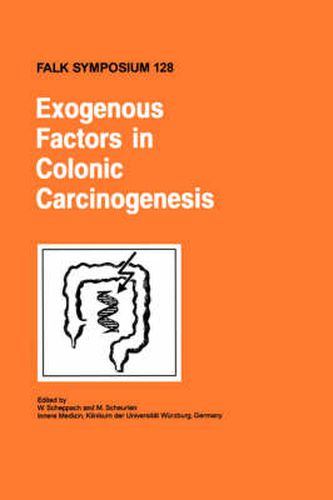Readings Newsletter
Become a Readings Member to make your shopping experience even easier.
Sign in or sign up for free!
You’re not far away from qualifying for FREE standard shipping within Australia
You’ve qualified for FREE standard shipping within Australia
The cart is loading…






This text presents the proceedings of Falk Symposium 128, held in Wurzburg, Germany, on May 2-3, 2002, and dedicated to the important issue of colonic carcinogenesis and its underlying genetic and environmental factors. Colorectal cancer is one of the leading causes of cancer-related death in industrialized countries. It has been recognized to be the consequence of a dynamic process leading from hyperproliferative epithelium through different classes of adenomas to invasive carcinoma. This adenoma-carcinoma sequence has been characterized on a molecular basis. Modern molecular biology has also helped to clarify the clustering of colorectal cancer within families, a phenomenon that has been known to clinicians for a long time. Thus, the pathogenesis of the two distinct familial colon cancer syndromes FAP (familial adenomatous polyposis) and HNPCC (hereditary non-polyposis colorectal cancer) is increasingly being understood. Thereby, an identification of affected people has become possible before the disease has manifested. There is also convincing evidence that the pathogenesis of sporadic colonic cancer is modulated by environmental, mainly nutritional, factors. Carcinogens seem to be far less important than the components of the normal human diet. It is likely that the interplay between protective and noxious dietary compounds determines the progression of the adenoma-carcinoma sequence. Additionally, a broad spectrum of drugs has been shown to affect colonic tumorigenesis, which provides the rationale for chemoprevention strategies. These issues set the scene for discussions on how genetic and environmental factors may interact in the pathogenesis of colonic cancer, contributing fresh ideas to the prevention of this most prevalent malignancy in the industrialized world.
$9.00 standard shipping within Australia
FREE standard shipping within Australia for orders over $100.00
Express & International shipping calculated at checkout
This text presents the proceedings of Falk Symposium 128, held in Wurzburg, Germany, on May 2-3, 2002, and dedicated to the important issue of colonic carcinogenesis and its underlying genetic and environmental factors. Colorectal cancer is one of the leading causes of cancer-related death in industrialized countries. It has been recognized to be the consequence of a dynamic process leading from hyperproliferative epithelium through different classes of adenomas to invasive carcinoma. This adenoma-carcinoma sequence has been characterized on a molecular basis. Modern molecular biology has also helped to clarify the clustering of colorectal cancer within families, a phenomenon that has been known to clinicians for a long time. Thus, the pathogenesis of the two distinct familial colon cancer syndromes FAP (familial adenomatous polyposis) and HNPCC (hereditary non-polyposis colorectal cancer) is increasingly being understood. Thereby, an identification of affected people has become possible before the disease has manifested. There is also convincing evidence that the pathogenesis of sporadic colonic cancer is modulated by environmental, mainly nutritional, factors. Carcinogens seem to be far less important than the components of the normal human diet. It is likely that the interplay between protective and noxious dietary compounds determines the progression of the adenoma-carcinoma sequence. Additionally, a broad spectrum of drugs has been shown to affect colonic tumorigenesis, which provides the rationale for chemoprevention strategies. These issues set the scene for discussions on how genetic and environmental factors may interact in the pathogenesis of colonic cancer, contributing fresh ideas to the prevention of this most prevalent malignancy in the industrialized world.